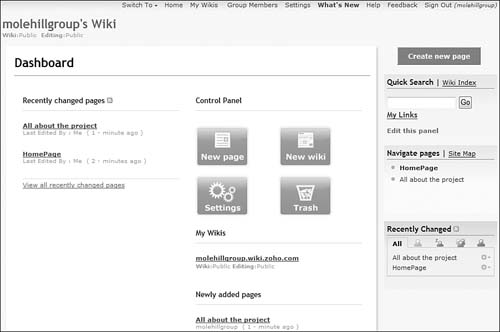Our final method of group collaboration is the wiki. You’re probably familiar with the concept of wikis, thanks to the web’s most popular wiki—Wikipedia.
If you’ve never used Wikipedia (www.wikipedia.org), you’re in for an eye opener. Wikipedia is, in essence, a giant online encyclopedia—but with a twist. Wikipedia’s content is created solely by the site’s users, resulting in the world’s largest online collaboration. Wikipedia articles are written, edited, and elaborated on by people of all types, from students, to subject-matter experts and professional researchers, to interested amateurs. It’s a true group collaboration.
Which is, in fact, what a wiki is—a collection of web pages where any users can contribute or modify content. The first wiki was WikiWikiWeb, a website founded in 1995 to facilitate the exchange of ideas between computer programmers. Wikis enable all users not only to write new articles, but also to comment on and edit existing articles.
Note
The word wiki comes from the Hawaiian word for “fast”—and is not an acronym for “what I know is,” as some suggest.
Today, many organizations use wikis as collaborative applications. A group wiki can be public (open to all users), as Wikipedia is, or private—which is ideal for project groups, businesses, and other organizations.
A private wiki invites all group members to create new pages on the wiki site or to edit any existing page. All writing and editing is done within the web browser, no extra software or tools necessary. In most instances, there is no review of the articles or edits before they’re accepted.
The result is a collection of articles or documents, written collaboratively. The wiki software organizes the articles behind the scenes and manages the versioning for each article.
Do you think a wiki is a good tool for your particular organization or project? If so, check out the following wiki hosting services; they make it easy to get your wiki up and running and to manage it on an ongoing basis.
PBwiki
PBwiki (www.pbwiki.com) offers various levels of wiki hosting. Small wikis (one to three users) are free; larger ones are priced as low as $4 per user per month. Wiki creation is easy, thanks to a variety of premade templates. You also get online file storage to help you organize your other documents as part of your wiki.
Versionate
Versionate (www.versionate.com) offers hosted wikis designed for group collaboration. A Versionate wiki is business friendly, thanks to SSL-level security and full control over editing privileges; you can also import Word, Excel, PowerPoint, and PDF documents into your wiki. The company offers several different plans: Free (500MB storage), Personal (2GB storage for $2/month), Business (unlimited storage for $25/month), and Enterprise (unlimited storage for $2/user/month).
wikihost.org
The wikihost.org site (www.wikihost.org) provides free wiki hosting. Wiki creation is via the GeboBebo engine, which offers a local database structure, user and rights management, RSS feeds and email notification for new and updated articles, and image and file uploading.
Wikispaces
zWikispaces (www.wikispaces.com) claims to host more than 450,000 individual wikis. Standard features include image and file uploading, widget and media embedding, RSS feeds and email notifications, discussion areas, and detailed user statistics. A variety of hosting plans are available, from Basic (free) to Private Label Premium ($800/month).
Zoho Wiki
Finally, from our friends at Zoho, comes their wiki application, Zoho Wiki (wiki.zoho.com). They offer free wiki hosting complete with WYSIWYG editing, versioning of wiki pages, and the ability to make your wiki public or private—all for free. Your wiki is managed from a Dashboard page, like the one shown in Figure 1; just click the New Page icon to add a new page to the wiki.
Figure 1. Using the Zoho Wiki Dashboard to manage a wiki.





